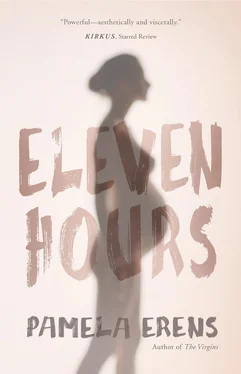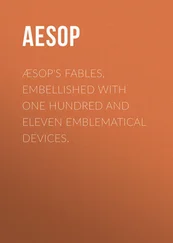“Would you like some water?” asks Franckline.
Lore shakes her head. A girl, yes, a girl, thinks Franckline, but there is something elderly about her as well, something weary. Not the usual weariness Franckline sees, that of a woman who has been up all night and is shaky and frightened, perhaps even her second or third time, but something deeper, something etched into the face — into the young skin that is just beginning to get creases around the eyes and lips — something that goes back a long time. A story I will never fully hear, Franckline thinks, even if she offers bits of it to me. For we only have a matter of hours, and it’s the body that concerns us here today, what it needs, what it has no choice but to do. Will Lore want to be touched or not touched, will she want kindness or to be ordered about? Will she let me help her or will she turn her face away as she does now? Will she spend all her time turning away?
The line on the monitor jumps and jags, the speaker reveals the rapid lub-lub-lub of the baby’s heartbeat. How startling it is to Franckline, still, after all this time: these machines at her disposal, machines that listen to the difference between life and death, that measure and probe and drip chemicals, and save, time and again, souls that can so easily flee the body and disperse. She has watched that flight and that dispersal, not here, not in America, never once (the other nurses say she carries luck with her; each of them has seen tragedies), but back in Ayiti. Babies that got wedged crosswise inside the mother, died there kicking against the womb, or were born already too malnourished to survive. The mothers often enough, too, infected or bleeding or too sick to endure a difficult labor. And the wailing of the burials after, families asking what they had done to displease Danto or Papa Ghede, promising penance, promising gifts, that they will never fail the spirits, the lwa , again.
(Franckline moves the monitor toward the patient and turns up the sound so she can hear. Lub-lub-lub-lub-lub . The reassuring babble her own child makes as well. A song to which she sings silently in return: hallelujah . But there is no smile, no apparent reaction, from Lore. The girl worries the silver ring on her finger.)
The baby’s heart beats like the heart of a runner; the baby is a runner, crouched on the starting mark, straining, desperate to begin. Lore has heard the sound twice before but this time she is not moved, only frightened for the baby, its heart frantic with the desire to emerge, to be done with this thing, this birth. The first time, Dr. Elspeth-Chang pointed out the heart on the sonogram machine in her office, but Lore could not see it. The sound the doctor told her was the heartbeat was merely static to her; she wondered for a moment if she’d misunderstood. Then the doctor pointed the sonogram probe at the screen—“There, you see? There”—but to Lore it looked like mist. “I don’t see it,” she repeated, and the doctor pushed the probe again at the screen and indicated with her finger — all smoke. If Asa had been there he would have seen, or would have convinced himself that he saw. Because Asa. If the sky were covered with gray-black clouds, if you could feel the dampness coalesce thickly and the air sweep upward in threatening gusts, he would say there was a little corner of sunlight in the sky over there — the weather was going to turn for the better.
But of course he was not there. Just weeks before, she had sent him away — or, more precisely, sent herself away, not wanting to remain in their apartment, which contained so many false memories. And the idea of something live beating within that smudge, that smoke, all at once unbalanced her. It was real, the child — and she had chosen. Although of course it was not too late to change her mind. She was only seven weeks along, she could still tell the doctor that she wanted an abortion. She could confess that Asa was not really on a work trip at all. But something inside her knit together and settled and she made her decision anew. She reached out and put her hand on Dr. Elspeth-Chang’s arm to stop the motion of the wand. “Oh, well,” she said. “Maybe next time.”
“Hello, hello,” says the resident loudly, coming in. Franckline turns the monitor’s speaker down; the baby’s heart fades into silence.
The resident — he identifies himself as Dr. Merchant — looks no more than Lore’s own age, glossy dark hair waved across his crown, a light shadow on his jaw and chin. A handsome man, too handsome, Lore thinks, to be a doctor. This handsomeness makes him look insufficiently competent. Lore cannot think why this strange, energetic doctor has come in, and then she recalls what the job of the resident is — to examine you. He is standing at the bottom of the bed, looking over at Lore, the hillocks of her breasts and belly, from the vantage point of her feet. For the first time she feels self-conscious in her hospital gown; she tugs at it to close it over her chest.
Dr. Merchant glances at the chart Franckline hands him. “You work for the Department of Education, huh?” he asks. “You’re a speech therapist? How do you like that?” He pulls on his surgical gloves.
“When was your last contraction?” he asks. Franckline helps Lore’s feet into the stirrups.
Not since leaving her apartment, she begins; she thinks the movement of the cab put the baby into a kind of— “Okay, relax,” the doctor says. “Now—” and he puts his fingers inside her. There is a strong, dull pain, a pain that makes her throat fill up. She concentrates on staying still and breathing in and out — must he stay there so long? — and on a beige square inside her head that seems the best equivalent of nowhere that she can come up with. The doctor removes his fingers and wipes them briskly on a towel.
“Now what were you saying?”
Not since her apartment, she explains, gratefully accepting the damp washcloth Franckline hands her, patting at her sweaty forehead and nose and neck. She left the house before eight. What time is it now?
“Just after nine,” the doctor tells her.
“They were coming every four minutes before I left.”
She had been determined not to get to the hospital too early. Her books said, her childbirth instructor said, that the earlier you got to the hospital the more chance there was that the doctors would come up with something to speed you up or slow you down, or run tests on you “just in case,” or hook you up to some machine or other — the more likely you were to end up with a C-section or at the very least an episiotomy. There were statistics to prove all this. Try to wait until six or seven centimeters , her childbirth instructor had said, but who knew when that was? You’ll have a pretty good idea , said the instructor. The contractions will be every four to five minutes and the quality of the pain changes. It becomes more intimate, more intense .
Well, in her apartment the pains, which had woken her at about 3:00 AM, were fierce enough to send Lore crouched on all fours clutching the pipes under the bathroom sink, pulling hard against them. You were supposed to relax and breathe, but she soon discovered it felt much better to pull hard at the pipes and curse loudly. The pains were intense, yes — but had she failed to let them become “intimate” enough? At six she called work and told them her labor had started. At seven thirty she got in touch with Dr. Elspeth-Chang’s answering service. When the doctor called back, fifteen minutes later, she had Lore hold the phone while she went through a contraction and told her, yes, it’s time to go in, I’ll call ahead.
Cursing under the pipes: Motherfucker cocksucking mother-shitting …
Читать дальше












